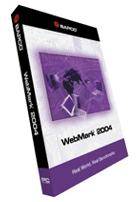The latest version of WebMark uses a lot of popular web plug-ins and technologies: Adobe Acrobat Reader v6.0, Macromedia Flash Player v7.0.14.0, Microsoft Windows Media Player 9, Macromedia Shockwave Player v 8.5.1, DHTML, JavaScript, Java Applets (SUN JRE 1.4.1), W3C SSL, XML and .NET Framework v1.1.
| WebMark® 2004 is a ground-up development, featuring new user driven
workloads. Usage models and scenarios are developed by experts using the
Internet in manners which reflect current and future computing trends. These
factors have enabled BAPCo to create a second generation of the WebMark
benchmark to further support Internet client testing by IT Managers, PC
OEMs, press and analysts worldwide.
WebMark 2004 represents a significant advance in ease of use for the testing of Internet client environments. Featuring two modes of operation, official scores can be reported in either on-line and offline mode. Offline mode enables users to discover the Internet client performance of their PC using content stored locally. On-line mode requires an additional server to host test content but further empowers users to measure additional technologies such as SSL (Secure Socket Layer) and web services. WebMark 2004 is an Internet technology based benchmark that accurately reflects usage patterns for business users in two Internet usage categories - Information Processing and Commercial Transactions. Each category represents the workload of a simulated user accomplishing a set of common tasks. Information Processing Information Processing is composed of activities focused on users viewing, researching and managing information on the Internet. Three websites - Portal, Research and Training are created to represent common Internet sites and activities that fall in this scenario. Portal: Represents intranet portals that offer company news, organizational updates and serve as a one-stop shop for employee services and intranet applications. Research: Represents activities that companies perform as they research customer issues or claims. Training: Represents those activities involved in the delivery of rich media content and data visualization for online training classes. Commercial Transactions Commercial Transactions is composed of activities involved in the commercial exchange of goods or services. Three websites (Purchasing, Finance and Marketplace) are created to represent common Internet sites and activities that fall in this scenario. Purchasing: Represents activities involved in the purchasing of goods or service from an online retailer or merchant. Finance: Represents activities provided by financial institutions for delivering trading services or financial information utilities such as stock quotes. Marketplace: Represents activities provided by an online marketplace that offers interactive tools to assist buyers and sellers in making purchasing decisions. |
 |